KARACHI: As 2023 draws to a close, Pakistan’s equity market has seen a remarkable 55 percent surge, its most significant in 13 years, despite the national currency depreciating 20 percent against the greenback, marking a year of dynamic and impactful financial transformations.
In the first half of the outgoing year, Pakistani capital markets faced substantial challenges, with ongoing economic issues and political uncertainty fueling rumors of an imminent default on the country’s international obligations.
However, a pivotal shift took place in the middle of 2023 when the coalition administration of former prime minister Shehbaz Sharif managed to secure a $3 billion standby arrangement (SBA) from the International Monetary Fund (IMF), providing a much-needed financial lifeline to the country.
The signing of the SBA brought significant jubilation to the equity market, heralding newfound optimism and stability after a period of prolonged uncertainty and turmoil. The benchmark KSE100 Index surged by 55 percent that implied a 24 percent increase in dollar terms.
According to Topline Securities, such massive gain was witnessed after a period of 13 years, following the 60 percent increase in the index in 2009.
“Pakistani stock market went up by more than 50 percent last year and it was up 65 to 70 percent from the second half of last year,” Ali Farid Khwaja, Chairman of KTrade Securities, told Arab News. “So, it was one of the best performing asset classes in Pakistan and one of the best performing markets among the emerging markets globally.”
Khwaja noted multiple drivers for the surge, with the IMF program and the subsequent increase in investor confidence being the most significant.
“In the first half of the year, people were worried that Pakistan could default,” he added.
The key stock index, KSE100, closed its year-end trading session at 62,451 points after hitting the all-time high of 66,426 from 40,420 recorded during the last trading session of 2022.
The bulls also found a plausible reason to further tighten their grip at the equity market after the caretaker government managed to secure financial support from friendly nations like Saudi Arabia and the United Arab Emirates (UAE).
Ahsan Mehanti, CEO of Arif Habib Corporation, also described the establishment of the Special Investment Facilitation Council (SIFC), a hybrid civil-military forum to fast-track decision making and encourage foreign currency inflow, as a positive development for the market.
He noted that it received “commitments of up to $100 billion from the Saudi government, UAE, Kuwait and Qatar.”
Mehanti maintained the Gulf countries’ financial assurances also convinced the IMF to release the funding under the SBA.
He noted that foreign corporates resorted to net buying of $73 million in 2023 after three years, recording highest inflows after a gap of eight years.
Pakistani financial analysts said they were optimistic about the stock market in 2024 due to cheap valuations, availability of liquidity, lack of investment avenues and expected interest rate fall from the historic high of 22 percent.
Unlike the equity market, the Pakistani currency market experienced one of the worst periods of depreciation, closing the year-end trade at Rs281.86 against the US dollar on Friday after the national currency lost about 20 percent value in the interbank market.
The rally in greenback after August 14, when the caretaker government took charge and the rupee came under further pressure amid speculation that the interim setup might allow the rupee to fall amid a tough situation in the open and black markets.
“Amid talks of default and turmoil there were three markets with different rates operating,” Zafar Sultan Paracha, general secretary of the Exchange Companies Association of Pakistan (ECAP), said, adding: “One was the grey market which had touched Rs350. The open market rate stood at Rs335, and the rupee had depreciated to 307 against the dollar in the interbank market. It was a very alarming situation at that time.”
Paracha gave credit to the army chief, General Asim Munir, for taking necessary steps that brought stability to the market.
“Due to the administrative measures taken by the army chief and his team, the smuggling of dollar to the neighboring country [Afghanistan], money laundering, flight of capital, hoarding and speculation stopped,” he said. “It was after a long time the same rate in interbank and open markets prevailed.”
The government also cracked down on exchange companies involved in illegal trade and increased the minimum capital requirement for them from Rs200 million to Rs500 million.
As a result, the rupee gained strength in the interbank market, appreciating by nine percent from an all-time low of Rs307 to Rs282 against the greenback while strengthening it in the open market by 16 percent.
However, Pakistani financial experts said the national currency was likely to lose ground against the dollar in the foreseeable future due to external payment pressures.
“Considering Pakistan’s external payment risk and other factors, we expect the rupee in the interbank market to reach Rs310 against the US dollar by June 2024 and Rs325 by December 2024,” Muhammad Sohail, CEO of Topline Securities, said.
Pakistan’s equity market surges 55% in 2023 despite national currency’s 20% decline
https://arab.news/rnn7p
Pakistan’s equity market surges 55% in 2023 despite national currency’s 20% decline
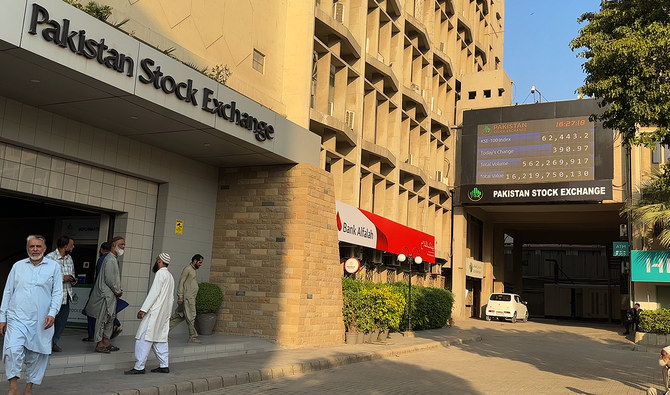
- The massive market gain came after a period of 13 years, following the 60 percent increase in the KSE100 index in 2009
- Analysts remain optimistic about the stock market in 2024 but fear the rupee will fall due to external payment pressures
Pakistan face New Zealand in 5th T20, aim to end series on positive note

- Two earlier defeats came as a jolt to full-strength Pakistan in their preparations for T20 World Cup
- New Zealand, missing a host of players, are likely to draw confidence from the wins against Pakistan
ISLAMABAD: Pakistan will be facing New Zealand in Lahore today, Saturday, in the final Twenty20 of their five-match series, Pakistani state media reported.
Pakistan have already lost the chance of clinching the series as the Babar Azam-led side trail the series 1-2, with the first game washed away by rain.
The ‘Green Shirts’ are looking to level the series with a win today.
“The match will start at 7:30 in evening,” the state-run Radio Pakistan broadcaster reported.
The defeats came as a jolt to a full-strength Pakistan side in their preparations for the Twenty20 World Cup to be held in the United States and West Indies in June.
New Zealand, missing a host of players due to the Indian Premier League, injuries and unavailability, are likely to draw confidence from their strength in depth going into the World Cup.
Egypt takes key role in renewed diplomatic push for truce in Gaza
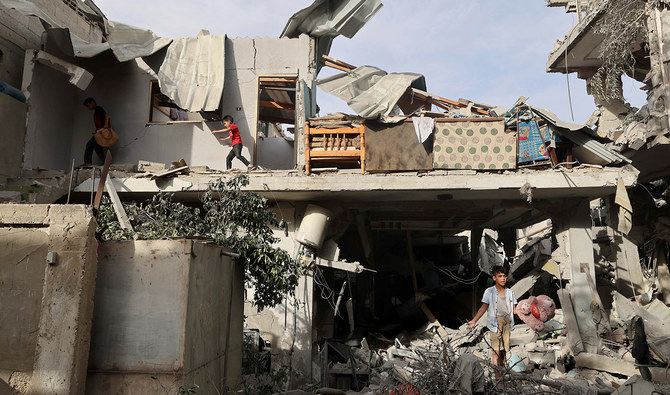
- Officials in Israel described latest moves as ‘an attempt by Egypt to restart the talks’ after Qatar mediation efforts broke down
- Egyptian intelligence chief Abbas Kamel to make clear ‘will not tolerate’ Israel’s deployments of troops along Gaza-Egypt border
CAIRO: A high-level Egyptian delegation was in Israel for talks on Friday amid a new diplomatic push for a truce in the Gaza war and the release of Israeli hostages held by Hamas.
The visit followed a trip to Cairo on Thursday by Israeli army chief Lt. Gen. Herzi Halevi and Shin Bet domestic intelligence service head Ronen Bar.
Officials in Israel described the latest moves as “an attempt by Egypt to restart the talks” after previous mediation efforts led by Qatar broke down. They told the Egyptian delegation that Israel was ready to give hostage negotiations “one last chance” to reach a deal before moving forward with an invasion of the southern city of Rafah.
“Israel told Egypt that it is serious about preparations for the operation in Rafah and that it will not let Hamas drag its feet,” one official said.
FASTFACT
34,356
Palestinians have been killed in the Gaza Strip during more than six months of war between Israel and Hamas.
Egypt is concerned about a potential influx of Palestinian refugees from Gaza if the war continues with the long-threatened Israeli offensive into Rafah, and has taken an increasingly active role in the negotiations.
“The Egyptians are really picking up the mantle on this. Egypt wants to see progress, not least because it’s worried about a prospective Rafah operation,” the official said.
Israel was increasingly looking past Qatar as a main broker, according to the official, after it failed to respond to Israeli demands to expel Hamas leaders from its territory or curb their finances.
“Qatar is still involved but in a lesser capacity,” the official said. “It’s clear to everyone they failed to deliver, even when it came to expelling Hamas or even shutting down their bank accounts.”
Hamas officials said they still considered Qatar a key mediator, alongside Egypt.
White House national security adviser Jake Sullivan said he saw fresh momentum in the talks.
“I believe that there is a renewed effort … to try to find a way forward,” he said “Do I think that there is … new life in these hostage talks? I believe there is.”
No new proposals
An official, who spoke on condition of anonymity, said Israel had no new proposals to make, although it was willing to consider a limited truce in which 33 hostages would be released by Hamas, instead of the 40 previously under discussion.
“There are no current hostage talks between Israel and Hamas, nor is there a new Israeli offer in that regard,” the official said. “What there is, is an attempt by Egypt to restart the talks with an Egyptian proposal that would entail the release of 33 hostages — women, elderly and infirm.”
According to Israeli media reports, Israeli intelligence officials believe there are 33 female, elderly and sick hostages left alive in Gaza, out of a total of 133 still being held by Hamas and other Palestinian militant groups.
There was no decision on how long any truce would last but if such an exchange were agreed, the pause in fighting would be “definitely less than six weeks,” the official said.
The visit by the Egyptian delegation came a day after the United States and 17 other countries appealed to Hamas to release all of its hostages as a pathway to end the crisis in Gaza. Hamas vowed not to relent to international pressure.
Hamas said it was “open to any ideas or proposals that take into account the needs and rights of our people.” However it stuck to central demands Israel has rejected, and said it criticized the statement for not calling for a permanent ceasefire and the withdrawal of Israeli forces from Gaza.
Pakistan gears up for PM Sharif’s visit to China in May
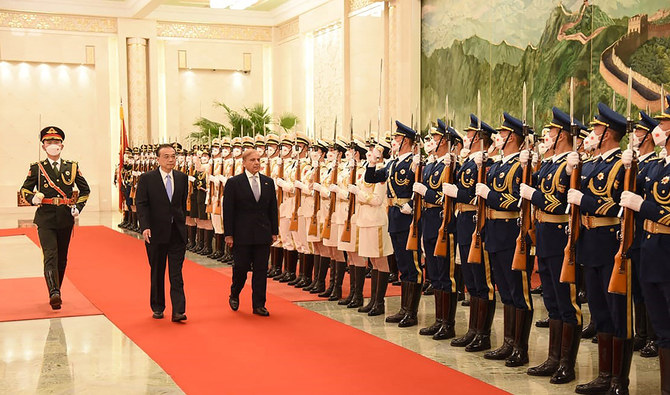
- Planning minister says China has invested $25 billion in infrastructure projects in Pakistan since 2013
- However, the undertaking has been affected by Pakistan’s financial woes, attacks on Chinese in recent years
ISLAMABAD: Pakistan is preparing for a possible visit by Prime Minister Shehbaz Sharif to China next month and the 13th meeting of a joint cooperation committee (JCC) on the China-Pakistan Economic Corridor (CPEC), the Pakistani planning ministry said on Friday.
The statement came after Planning Minister Ahsan Iqbal presided over a meeting with regard to the prime minister’s visit and preparations for the 13th JCC meeting.
Sharif is expected to visit China in May to restore Beijing’s confidence in Islamabad with regard to various Chinese-funded projects, Pakistani state media reported this month, citing a senior official.
“The federal minister said that the prime minister’s visit to China will be of great importance and China wishes that the 13th JCC [meeting] is held before this visit,” the Pakistani planning ministry said in a statement.
“So that projects, including five new economic corridors, can be accelerated and the desired results can be obtained from the visit.”
Beijing is investing over $65 billion in energy and infrastructure projects in Pakistan as part of CPEC, a major segment of Beijing’s Belt and Road infrastructure initiative, which will connect China to the Arabian Sea and help Islamabad expand and modernize its economy through a network of roads, railways, pipelines and ports in Pakistan.
Since its initiation in 2013, CPEC has seen tens of billions of dollars funnelled into massive transport, energy and infrastructure projects. But the undertaking has also been hit by Pakistan struggling to keep up its financial obligations as well as militant attacks on Chinese nationals in Pakistan.
From 2013 to 2018, Iqbal said, China invested $25 billion in Pakistan under CPEC that improved economic condition of the country.
He said his government was currently taking steps to implement CPEC projects and was determined to soon complete them.
Green glamor: Young Pakistani innovators transform electronic waste into fashionable jewelry
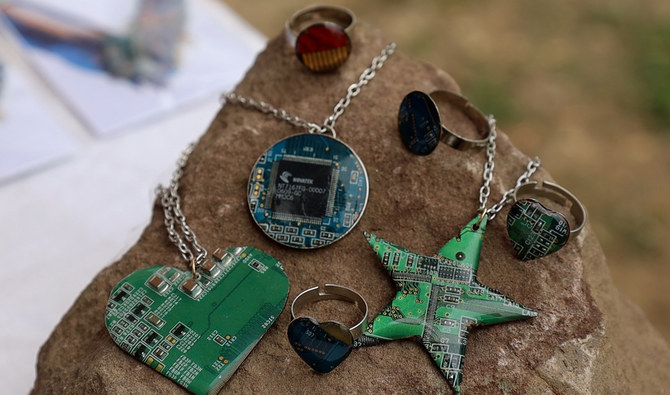
- Jewelry crafted from electronic scrap appeals to a young demographic that values innovation, ethical lifestyle choices
- Sameer Asif began to pursue entrepreneurial dream by partnering with a classmate to launch ‘Wired Wonders’ in 2023
ISLAMABAD: In a room filled with discarded computer components and broken electronic items, 21-year-old Sameer Asif works under a bright fluorescent light, meticulously shaping an old motherboard into a heart-shaped pendant.
His project is more than a hobby; it’s the core of his entrepreneurial dream, “Wired Wonders,” a venture launched in 2023 to transform electronic waste into wearable art.
Jewelry crafted from electronic scrap aligns with a global trend in sustainable fashion, appealing to a young demographic that values innovation, individuality and ethical lifestyle choices.
Despite its niche market appeal, this form of jewelry reflects a growing interest in repurposing materials that would otherwise contribute to landfills, offering a creative solution to the challenge of electronic waste.
For Asif, however, the whole thing began as an accident.
“I was always into arts and crafts as a child,” he told Arab News in a conversation this week. “I enjoyed giving handmade things, and the first-ever necklace I made from a motherboard was also a gift for my friend.”
“She wore it to the university, and people started asking her about it,” he continued. “That’s when we thought this could actually become a business since people were interested in it.”
Asif said he was fascinated by electronics since childhood, using his tools to dismantle sophisticated gadgets to understand how they worked.
“When I was like five or six years old, on my birthday, someone gifted me a toy set of mechanical things,” he recalled. “It had nuts and screws, and it came with a screwdriver. I used that screwdriver to open my brother’s PlayStation 2 which he really loved.”
“I just opened it but couldn’t fit it back,” he recalled with a smile, saying his brother and parents were not pleased with him.
Asif partnered with his friend Maham Usman to launch Wired Wonders, asking her to manage the social media, sales and marketing.
Asked about the challenges of developing a small niche business, Usman said the biggest problem was procuring discarded motherboards that were not readily available.
“There are like one or two scrapyards in Rawalpindi where they sell discarded electronics in bulk,” she said. “To tackle this challenge, we have started a recycling initiative where we ask people to donate the electronic devices they want to dispense with. Not only will this help us with business, but it is also good for the environment.”
Making a single piece of jewelry can take about two hours. The process involves cutting and shaping motherboard pieces, removing the sharp edges and then pouring resin – a transparent, viscous liquid – over it for shine and preservation. Thereafter, the piece is left to dry for 24 hours.
Asked about the prices of their products, the Wired Wonders’ team informed that they ranged from $1.40 to $7.
“The gold and copper in motherboards add unique value to our jewelry,” Usman said.
China unveils first Hangor-class submarine developed for Pakistan
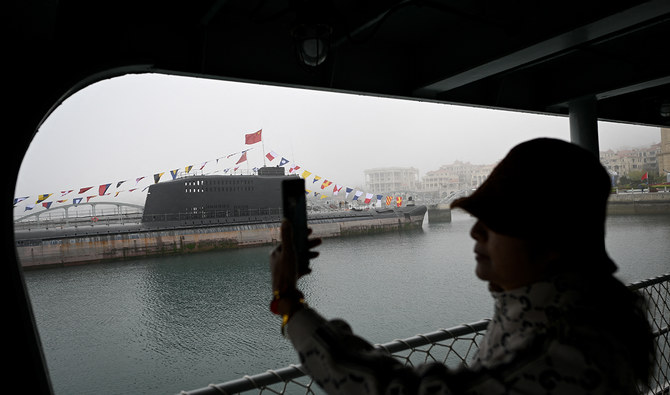
- Islamabad signed agreement for the acquisition of eight submarines during President Xi’s visit to Pakistan
- Under the contract, four submarines will be built in China, while other four will be built at Karachi Shipyard
ISLAMABAD: China on Friday unveiled the first Hangor-class submarine that it has developed for Pakistan, the Pakistani military said.
The Pakistani government had signed an agreement with Beijing for the acquisition of eight Hangor-class submarines during the visit of Chinese President Xi Jinping to Pakistan.
The first of these submarines was launched at a ceremony held at Shuangliu Base in China’s Wuhan, which was attended by Pakistan’s Chief of the Naval Staff Admiral Naveed Ashraf as the chief guest, according to the Inter-Services Public Relations, the Pakistani military’s media wing.
“Under the contract, four submarines will be built in China while the other four will be built at Karachi Shipyard and Engineering Works Limited in Pakistan,” the ISPR said in a statement.
“These submarines will be equipped with advanced weapons and sensors to target long-range targets.”
The ISPR said the project would add a new dimension to Pakistan-China friendship. China has been one of Pakistan’s most trusted friends and both countries have worked on a number of joint projects in the field of defense in recent years.
Besides, Beijing is investing over $65 billion in energy and infrastructure projects in Pakistan as part of China-Pakistan Economic Corridor (CPEC), a major segment of its Belt and Road Initiative designed to give China a shorter, more secure trading route to the Middle East and beyond, while also boosting Pakistan’s economy.
Since its initiation in 2013, CPEC has seen tens of billions of dollars funnelled into massive transport, energy and infrastructure projects. Beijing has also often provided financial assistance to bail out its often-struggling neighbor in times of a financial crunch.











